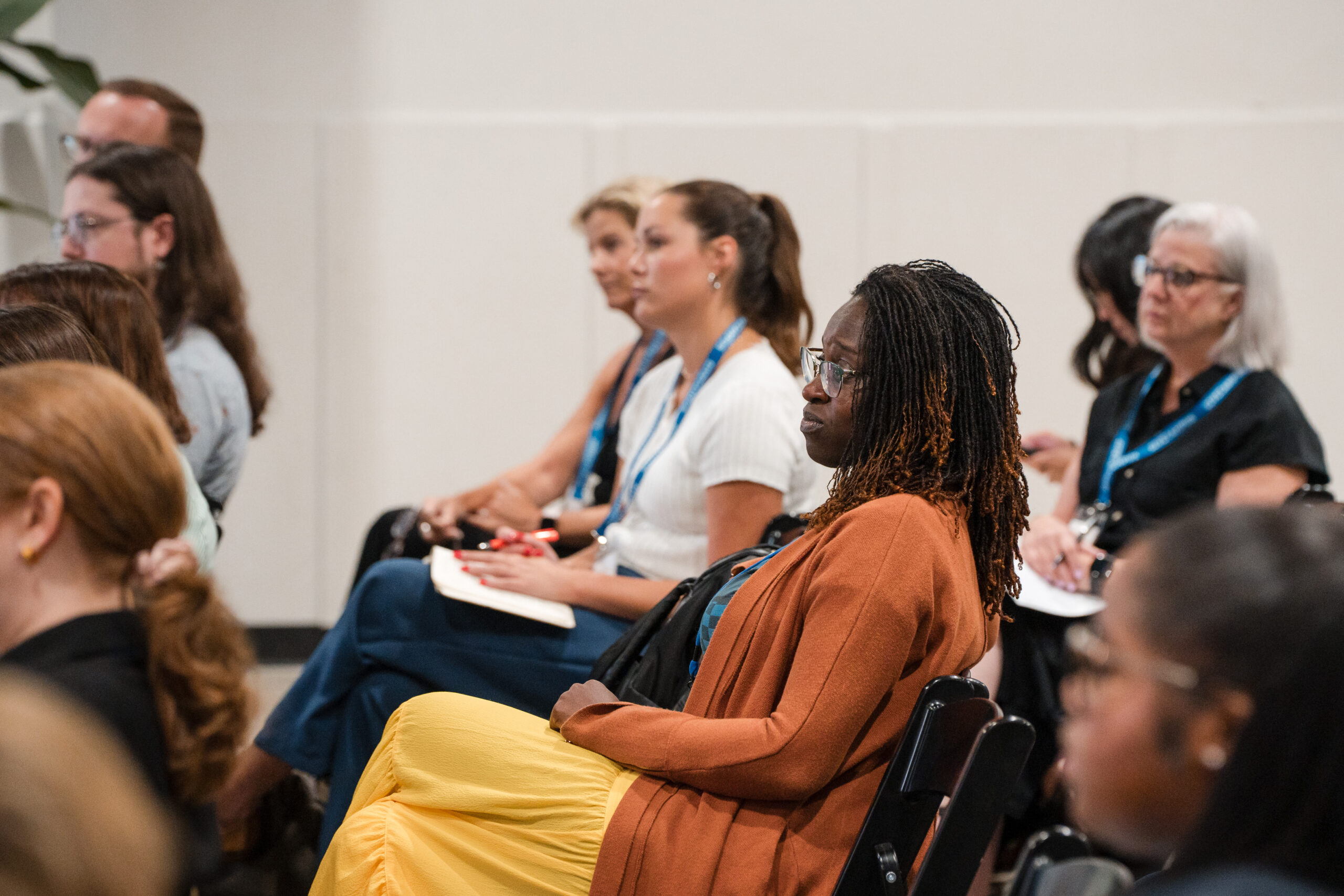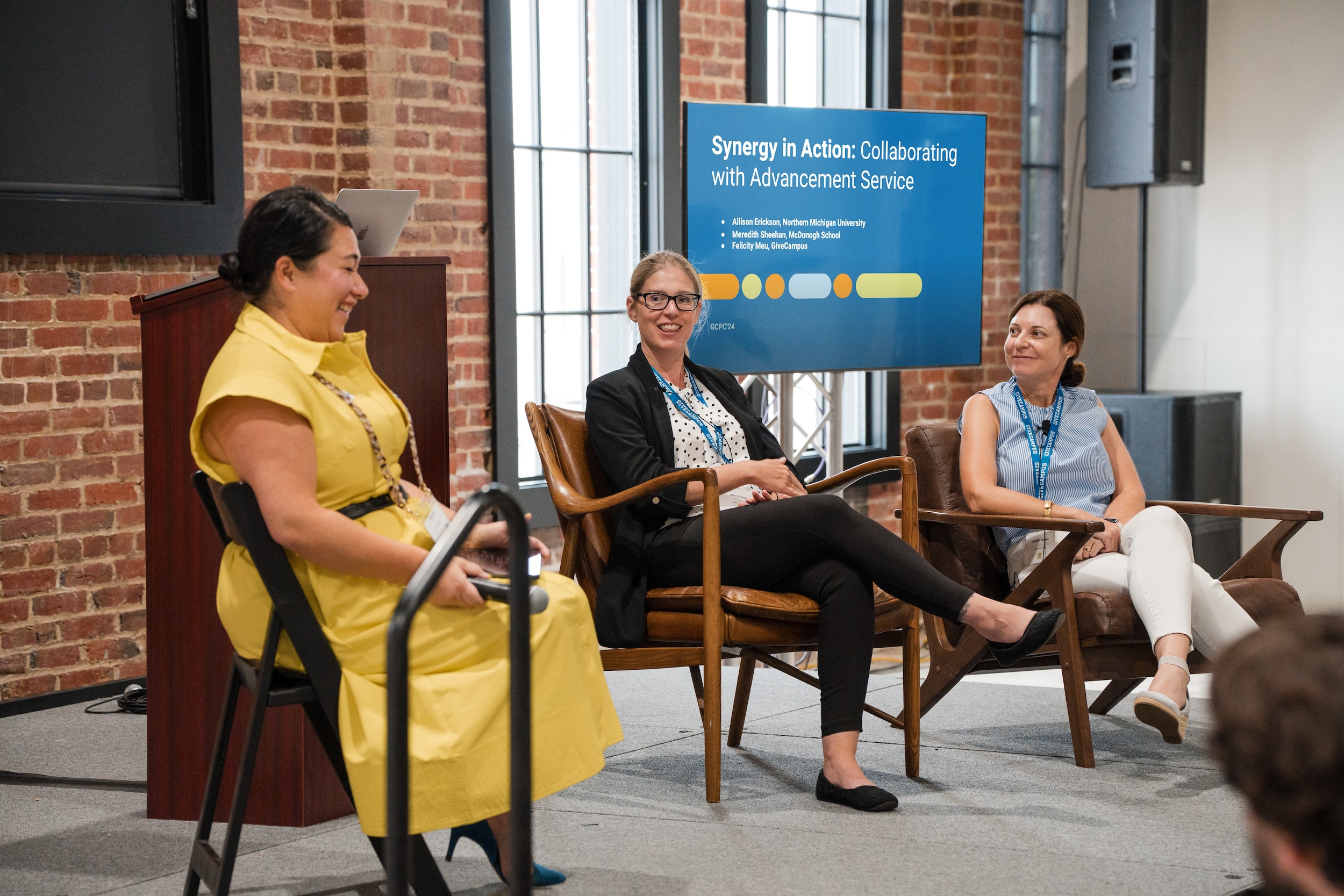Felicity Meu, Senior Director of Partner Success at GiveCampus, recently sat down with Allison Erickson from Northern Michigan University and Meredith Sheehan from McDonogh School to talk about the role advancement services plays in supporting institutional goals and driving impact. Below you’ll find highlights from their enlightening conversation which explored how advancement services teams can effectively provide the essential data and infrastructure needed across teams. Read on to learn how these professionals bridge gaps between departments, navigate resource constraints, and prepare for an evolving landscape.
A conversation with advancement services
How does your role as an advancement services professional play a part in your institution’s broader mission and goals?
Allison Erickson, Senior Director Advancement Services, Northern Michigan University
I see advancement services as the backbone of advancement. We provide the data that everyone needs to do their job in advancement, whether it’s giving major gift officers a portfolio to work with, providing annual giving with the list that they need to do their appeals, or identifying a list of donors for our stewardship and donor relations person so that they can effectively thank those donors. It all stems from where we live.
What can advancement teams do to help ensure data quality in your systems of record?
Meredith Sheehan, Assistant Director of Advancement Services, McDonogh School
We are really picky about who we let enter [data into our systems]. Quality control is very important. Always think about what the end use is going to be. Someone might think at first, that it makes sense to put “X” data in the “Y” field. But, after having a consultation with advancement services, they may realize that this setup will not be very searchable or user-friendly, especially as the data builds over time. You always want your data set up in a clean and consistent way.
What is the biggest challenge of your work today?
Allison Erickson, Senior Director Advancement Services, Northern Michigan University
For me, and I think probably for a lot of us in advancement services, it’s limited resources. We’re trying to do as much as we can with just the eight hours that we have in the day and the small three-person team that we have. We can see the big picture. We know what we want to do, but there’s a lot that it takes to get to that point.
How do you see the role of advancement services evolving in the next 5 to 10 years, especially with the rapid pace of innovation and AI entering the scene?
Meredith Sheehan, Assistant Director of Advancement Services, McDonogh School
I would say the role of advancement services is just going to get bigger. I’ve been doing this for 16 years and when I started, it was the job that nobody wanted. It was literally entering checks into a database. Now it’s a mark of prestige to have a well-built-out advancement services department and advancement services are getting a bigger seat at the table.
Allison Erickson, Senior Director Advancement Services, Northern Michigan University
I’m really excited about some of the things that I’ve seen as far as AI and the way that that will change the work that we do. I feel like it’s going to open us up and allow us to work in new ways and find new ways of doing things, including some things that we weren’t doing in the past because some of the more day-to-day tasks are now able to be handled by AI.

In what ways does your team intersect with other departments? Which teams do you spend the most time with, and who do you wish you were closer to?
Meredith Sheehan Assistant Director of Advancement Services, McDonogh School
Our development office is made up of 18 people, with three of us working in advancement services. While I attend all the annual programs and campaign meetings, my primary focus is on the annual programs and alumni relations. I have a counterpart who handles the major gifts side of things and they attend the major campaign and annual fund meetings.
Although we focus on different areas, both of us are deeply embedded in our respective teams, which gives us a complete view of the department’s activities as a whole. If one side isn’t aware of what the other is doing, we in advancement services are the ones who bridge the gap. We ensure that everyone is aligned and working toward the same goals, moving forward together as one cohesive team.
How have you navigated conversations around giving forms, balancing the need for a frictionless experience with the need for thoughtful data upgrades?
Allison Erickson, Senior Director Advancement Services, Northern Michigan University
I think it was helpful to have everyone in the room when we initially set our giving form up. We were able to reevaluate the process we were using, think through what we wanted to collect, and ultimately determine if we really needed every piece of data. Phone numbers were one of our sticky issues. If there’s an issue with a gift, you want to be able to call the person. But, we looked at our data and realized that maybe we’re only calling two out of all the donors that come in. So maybe that’s not something we need to have front and center on our form. It’s exciting to see that we’re meeting in the middle in terms of what it looks like to have both great conversion and fast forms but still obtaining the data needed to honor these donors.
What is one thing you would share with your frontline fundraising and annual fund colleagues on how to be a good partner to advancement services?
Meredith Sheehan Assistant Director of Advancement Services, McDonogh School
Plan ahead! I often hear, “I just need this by the end of today,” or, “I just need this by the end of the week.” There’s no such thing as “just” when you’re dealing with data. Nothing is simple. We have different codes for various communication preferences, such as people who don’t want to hear from us at all or who only want email but not texts. It’s very nuanced.
Anything that seems like a simple list request actually involves a 12-step process on the back end to get you that list and to make sure it’s correct so you’re not embarrassed when reaching out. You don’t want to contact someone who previously told us not to or said they weren’t interested in a particular priority. Getting it right really helps everyone.
Conclusion
Allison Erickson and Meredith Sheehan’s insights reveal how essential advancement services teams are to supporting strategic goals, maintaining data quality, and navigating the evolving landscape of advancement. GiveCampus is dedicated to partnering with advancement services professionals, providing tools and resources to streamline their work and help them—and their broader teams—achieve greater impact.
